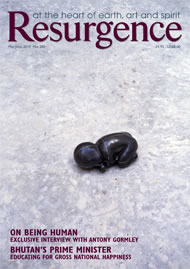In November 2008, Georgina Downs won a landmark High Court action against the UK government over its failure to protect rural residents against exposure to harmful pesticides. It was the first known legal case of its kind to directly challenge UK pesticide policy and agricultural practice.
With the media dubbing the case and the campaign ‘Georgina versus Goliath’, the High Court ruling was subsequently overturned in a controversial Appeal Court decision last year.
Many people, deciding the fight had become too long and too hard, might well have given up at this point, but not Georgina, who is now preparing to take her campaign to protect the public from the health impacts of agricultural chemicals to the European Court of Human Rights.
So why is she still fighting? What is driving her on?
“Well, I’d prefer not to be fighting the government,” she replies, “but I’ve come so far in the last nine years in my campaign to fight for people who are being poisoned by the UK policy on pesticides that I have to exhaust all legal options open to me.”
Georgina has direct experience of pesticide poisoning, and it was her own health issues that initially triggered the campaign. In the early 1980s, her parents moved to the Sussex countryside specifically to raise their family in what they thought would be a healthy environment. They designed and built their house on a piece of land bordering farmland which was initially used for grazing but later converted to arable crops that were regularly sprayed with pesticides.
“We were never warned about the dangers of the chemicals being used,” explains Georgina, “and so, from the age of eleven, I would regularly be out in the garden when crop-spraying was taking place, with the tractor passing only a few feet away from me.”
Georgina began to suffer chronic health problems including headaches, dizziness and tinnitus. These became so bad that by the age of eighteen she was admitted to hospital with severe muscle wastage and other neurological problems. After tests ruled out a range of diseases such as Parkinson’s, multiple sclerosis and motor neurone disease, it was Georgina herself who finally realised the cause of the problem. “I was looking out the window from home one day and the penny finally dropped,” she says.
“I saw a tractor in the adjoining field spraying something and started to wonder what it was. I made some enquiries and was astonished to discover they were spraying a cocktail of poisonous chemicals into the air where we live and breathe. I was even more astonished to find out that a farmer is permitted to do so under existing government policy.”
As a result of her own investigations, Georgina’s doctors confirmed her condition as neurological damage caused by exposure to pesticides, and the medical details, which included blood and fat tissue samples, all containing high pesticide levels, were incorporated into the body of evidence in her campaign.
“When I first started going to meetings to find out more about the regulatory system for pesticides, I realised that no-one was representing my position as a rural resident being subjected to a high level of pesticide exposure,” she recalls. “So I decided that I would have to try and change the government’s policy on pesticides myself. Naively, I thought that it would take me about a year. Nine years on, it still takes up all of my time.”
From the start, Georgina’s campaign has been about changing government policy to protect people in the countryside who live, work or go to school near crop-sprayed fields. Since she began, she has received the support of many rural residents across the UK who report chronic illnesses – including cancers, neurological conditions, asthmas and allergies – that they too are convinced are a result of living or working next to sprayed crops. “Doctors and medical people aren’t trained to ask about chemical exposure, so they’re usually not going to know about what is causing these illnesses,” Georgina explains.
Georgina’s campaign wants the government’s pesticide policy to be changed in three clearly identified ways: a ban on any crop-spraying near to houses and schools; prior warning of any crop-spraying activity by farmers to local residents; and a legal requirement that residents be told what pesticides are being used, and when.
Her main argument is that the current method of assessing risks to the public is based on the model of a ‘bystander’ – an individual who is exposed briefly to a spray-cloud at the time of an application. It does not cover the scenario of residents who are repeatedly exposed to mixtures of pesticides throughout the year and over long periods of time.
“The fact that there is no risk assessment for long-term exposure of those who live, work or go to school near pesticide-sprayed fields is astonishing,” says Georgina, “particularly considering that crop-spraying has been a dominant feature of agriculture for over fifty years. The government has conditions of use for protection of animals, wildlife and the environment, but nothing for the protection of residents and communities.”
Despite meetings with government ministers, officials and advisers as far back as 2002, and despite their promises to act on her evidence, it wasn’t until 2008 that Georgina’s argument had any official recognition thanks to the historic High Court ruling in her favour. In that hearing, her evidence, which included medical information about herself and others across the country, as well as data on flawed safety assessments generated by the government itself, was found to be irrefutable on the case put forward, including on human rights.
The High Court judge, Mr Justice Collins, stated that, in her case against UK pesticide policy, Georgina had produced “cogent arguments and evidence to indicate that the approach does not adequately protect residents”, and “solid evidence that residents have suffered harm to their health”. He concluded that Defra “must take steps to produce an adequate assessment of the risks to residents”.
“I thought, at last. Now the government will have to change its pesticide policy,” says Georgina. “I thought there would be no way for them not to change it, given that the evidence was unarguable.”
But eight months later, the High Court judgment was overturned by the Court of Appeal, which ruled that the detailed evidence Georgina had amassed over nine years could not be used against the government because she had “no formal scientific or medical qualifications”. Instead, her original case and witness statements were substituted with the conclusions of a government-funded report published four years earlier.
“The Court of Appeal judgment was bizarre and inaccurate,” says Georgina, whose next stop, now that the Supreme Court has ruled out any further UK appeal, is the European Court of Human Rights.
“The High Court judge was very clear that the government had been acting unlawfully in its policy and approach to crop-spraying and that an appeal had no real chance of success. This was based on the evidence I provided. But the appeal judgment was not based on the evidence I provided. It was based on the evidence of a third party – which meant that it was no longer even a case of Georgina Downs versus Defra. It was clear to me right from the beginning of the appeal hearing that the High Court judgment was going to be overturned.”
In fact, despite winning the appeal, Defra has pledged to change its pesticide policy and has just completed a public consultation process which it publicly acknowledged was a direct result of Georgina’s case. So, in some ways, and regardless of any ultimate legal outcome, she may have won after all.
“The court case was only one small way in which I tried to force the government to act,” she says. “If pesticide policy is eventually changed as a result then the outcome of the legal case will not be as critical. But in the meantime, I will exhaust all the legal options open to me, and if the European Court were to rule that there has been a breach of human rights then it would help people all around the world who are in the same position as I am.”
At the age of thirty-six, Georgina still suffers from her original symptoms and has other health problems, including osteoporosis with a high risk of fracture. Her father, who has also been badly affected over years of living so close to farmland, now wears a respirator, goggles and other protective clothing in his own garden when the neighbouring farmers are crop-spraying.
“The problem I have been up against in this campaign is that there is huge financial and political pressure for the government to maintain the status quo on this issue,” explains Georgina.
And she’s right that there is currently a clear and bizarre mismatch between the government’s long-standing failure to protect people from passive exposure to pesticides, and its approach in other comparable policy areas such as smoking in public places, asbestos and straw burning, all of which have ended in a ban for the protection of public health.
The fact is that pesticides are big business. Sales of pesticides in the UK alone are in the region of £490 million every year, and according to one report, the value of the world pesticide industry grew a staggering 29% to US$52 billion in 2008. The government regulators receive approximately £7 million a year from the industry to grant pesticide approvals, so any change in the system is going to dramatically affect that revenue stream.
“The government is well aware of the financial implications, plus the fact that a ruling in my favour would have opened the floodgates to compensation claims from other individuals who have similarly suffered adverse effects from exposure to crop sprays,” adds Georgina.
She admits it has now become her life’s work to get agricultural policy changed, but she knows that the only way to ultimately protect public health is to prevent exposure to pesticides altogether and that this will only be achieved through sustainable, non-chemical farming.
“There is so much lobbying from the pesticide industry asserting that food production will decrease without these chemicals, but there’s no evidence in this country to prove that,” she says.
I wonder, as we come to the end of the interview and Georgina starts to explain the enormous workload she now faces in preparing for the European Court, whether it has all been worth it.
Her response is categorical.
“Considering how many people know about the health risks from crop-spraying as a result of the campaign, it has definitely been worth it. Members of the public have a right to the information they need to make informed and knowledgeable decisions to protect their health and that of their family.
“If the government isn’t going to tell people the facts, then, with all the scientific evidence I have amassed over the last nine years, I would be acting completely irresponsibly if I didn’t. I am planning to make a documentary and write a book. Both will be about how far one person has had to go to get the government to do what it should have been doing in the first place – protecting the health of its own citizens.”







